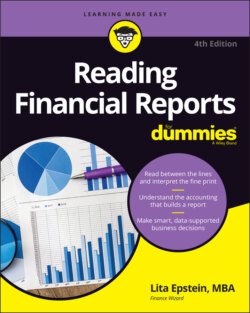Читать книгу Reading Financial Reports For Dummies - Lita Epstein - Страница 33
Keeping taxes personal
ОглавлениеSole proprietorships aren't taxable entities, and sole proprietors don't have to fill out separate tax forms for their businesses. The only financial reporting sole proprietors must do is add a few forms about their business entity to their personal tax returns.
Most sole proprietors add Schedule C — a “Profit or Loss from Business” form — to their personal tax returns, but some choose an even simpler form, called Schedule C-EZ, “Net Profit from Business.” In addition, a sole proprietor must pay both the employer and employee sides of Social Security and Medicare taxes using Schedule SE, “Self-Employment Tax.” These taxes total 15.3 percent of net business income, or the business income after all business expenses have been subtracted.
Sole proprietors in specialized businesses may have different IRS forms to fill out. Farmers use Schedule F, “Profit or Loss from Farming.” People who own rental real estate but don't operate a real estate business use Schedule E, “Supplemental Income and Loss.”
